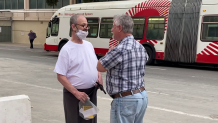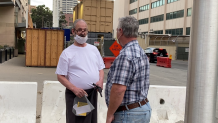When Mark first glimpsed his brother, Alan Alter, being escorted by Sheriff’s deputies out the back door of the San Diego County Jail, he let out a laugh of stunned relief. It was Jan. 7, 2021, and the first time he had seen or even talked to his brother in decades.
For nearly 24 years, Alan Alter, a 71-year-old veteran of the Vietnam War, had been unlawfully committed to a California state hospital, according to his attorney.
The commitment, NBC 7 found, was the result of a sequence of trickle-down oversights starting at the top, with the state of California’s Department of Corrections and Rehabilitation and Board of Parole Hearings, all the way down to the local level with the San Diego County District Attorney’s office and Public Defender’s office.
As they approached each other, Mark Alter took down his face mask and grabbed his older brother’s shoulders. Alan Alter was wearing an oversized, jail-issued T-shirt and sweatpants and carrying a small zip-lock bag that contained the only possessions to his name after years of confinement. A small, sheepish smile creeped out the edges of Alan Alter's mask and his eyes seemed to convey a sense of disbelief that this surreal moment was even happening.
When asked if he thought he would ever be let out, Alan Alter said he hoped so, “eventually.”
Alan Alter’s story is not only about a veteran whose liberties were taken away for more than two decades, or the historical misunderstandings surrounding care for those with severe Post-traumatic stress disorder (PTSD) and mental illnesses; but is also about the possibility of other persons out there who are currently being held illegally under the same state program that Alan Alter was in due to a lack of oversight -- the Mentally Disordered Offender (MDO) program.
The MDO program was created to hold criminal offenders in California state hospitals past their parole dates if the state determines they pose a risk to themselves or society.
According to the state law that created the program, offenders who qualify to be involuntarily committed to a state hospital past their parole dates must have committed certain “qualifying offenses” or crimes of force or violence. Alan Alter’s offense was not listed as a “qualifying offense” yet he was still admitted into the program back in 1997, and his involuntary commitment was extended each year through 2020.
State and local officials said at the time of Alan Alter’s commitment, the law was unclear, and they believed his offense qualified for the program.

The series of mistakes in his case -- followed by inquiries and questions by NBC 7 -- has resulted in the San Diego County District Attorney and Public Defender’s offices announcing they will review hundreds of cases dating back to the late '80s to ensure no one else fell through the same cracks as Alan Alter did.
The meeting outside of the San Diego County Jail -- a moment with his brother that Mark Alter had waited years for and vowed for on their mother’s death-bed -- was bittersweet.
“Why was it so hard just to get to this point?” Mark Alter said. “The hardest part was just feeling like he had fallen into a black hole and was swallowed up. And there was no way to reach him.”
Alan Alter was born in Fort Wayne, Indiana, and always seemed to have an easy time with his grades and athletics, according to his younger brother. In 1968, At the age of 19, Alan Alter enlisted with the U.S. Marine Corps and was dispatched to fight in the Vietnam War.
But when he returned to the U.S. two years later, Mark Alter could already see the detrimental effect war had on him. The man who went to Vietnam was not the man who came back.
“(The Marines) didn't have many places to put all the troops when bringing them home, so they told Alan he could get out early and go on home,” Mark Alter recalled. “But I think that was maybe a mistake. Getting out is OK, but he didn't really have any time to unwind or unplug from what was going on.”

Throughout the '70s and '80s, Alan Alter’s family said he would wander from place to place, documented by scattered non-violent run-ins with police in Alaska, Hawaii and Georgia.
Alan Alter was eventually diagnosed with PTSD and schizophrenia, stemming from his war trauma, according to his family. His brother said Alan Alter failed to get the help he needed.
“He wandered a lot,” Mark Alter said. “He had trouble assimilating back into daily life and dealing with things… somehow that led to him being incarcerated.”
In 1986, a small fire in San Diego County would put Alan Alter on the path toward his eventual decades-long confinement, out of reach from his loved ones.
California Highway Patrol officers and firefighters for the Lakeside Fire Department were called out on the morning of March 16, 1986, to Highway 67 after reports of a small brush fire in the highway median. Upon arrival, firefighters saw Alan Alter, 36-years-old at the time, standing by.

Firefighters would later testify the fire was only 4-feet by 4-feet, and that it hadn’t spread to any vehicles or properties in the area, according to court transcripts reviewed for this story.
When asked by firefighters, Alan Alter admitted he had started the fire. On scene, the firefighters said he had made “incoherent statements,” according to their court testimony months later.
Alan Alter was arrested for unlawfully starting a fire on forest land -- specifically penal code 452(c). He told his family at the time that his intentions weren’t to harm anyone.
“Pretty big stretch to call it arson,” Mark Alter said. “He wasn’t burning down a building, he was just trying to get someone to stop and basically get him off the highway.”
The felony charge led to a guilty plea and a sentence of one year in jail, followed by five years probation.
Court transcripts show the judge who accepted Alan’s plea deal said the fire was, “along a major freeway. Even if the other area didn’t burn, the smoke danger and everything to vehicles traveling on the major freeway adds an additional element of seriousness to the particular allegation.”
Alan Alter served his time for the fire. After a year behind bars, he was released on parole. But in 1996, after presumably wandering again, court records show Alan Alter did not show up to one of his last parole hearings. Police eventually caught up with Alter and he was back behind bars, ordered to serve two years in state prison.
But this time, Alter’s sentence was carried out differently.
A year into his prison sentence, court records show Alan Alter was admitted into Atascadero State Hospital under the Mentally Disordered Offender or MDO program (years later, the state would start calling it the Offenders with Mental Disorders program).
The MDO program was created by a law enacted in 1985, requiring criminal offenders who have been convicted of violent or qualifying offenses related to their mental disorders, and who are determined to pose a risk to society, to be held past their prison term, according to the California Department of Corrections and Rehabilitation.
Alter was recommended for commitment under the MDO program after an evaluation by the state Board of Parole Hearings concluded it “was in Mr. Alter's best interest and in the interest of the public's safety,” according to the District Attorney’s office.
When his parole termination date approached in 2000, a letter from Atascadero State Hospital’s Medical Director at the time recommended “involuntary confinement” be continued for Alan Alter in the program.
And every year that followed, Alan Alter’s continued confinement under the program was approved.
But Alan Alter’s offense -- unlawfully starting a fire -- was neither violent nor was it listed as a qualifying offense under the MDO law at the time of his commitment in 1997, according to Alter’s defense attorney.
While the California Department of Corrections and Rehabilitation and the San Diego County District Attorney’s office agree that Alter’s offense does not qualify under the MDO law now, both agencies said that wasn’t clear at the time of his commitment.
A spokesperson for the San Diego County District Attorney’s office said up until a state court of appeals ruling in the year 2003, “there was nothing concrete in the law saying Mr. Alter's offense did or did not qualify him for the MDO program.”
In 2003, the state court of appeals issued a ruling in the case of People v. Rudolf Hayes -- a case with similar circumstances to Alan Alter’s. In their ruling, the court affirmed that Hayes’ offense of unlawfully starting a fire “was not a qualifying crime under the MDO law.”
It concluded, “the Legislature did not intend to include recklessly causing a fire among the offenses that qualify for commitment as an MDO.”
Alan Alter's defense attorney and attorney Rod Jones, who represented Rudolf Hayes in that 2003 appeals case, disagree with the San Diego District Attorney's stance, saying the offense of unlawfully starting a fire was never a qualifying MDO offense.
But despite the 2003 appeals court ruling, records show neither the state’s Board of Parole Hearings, prosecutors in the District Attorney’s office, nor the Public Defender appointed to represent Alan Alter caught this acknowledgment of the existing law during his annual MDO Program reviews -- and Alan Alter continued to stay involuntarily confined to state hospitals.
In response to questions about Alan Alter’s case, the District Attorney’s office said, “Prosecutors do not, as a matter of course, review the law or relitigate original charges when filing yearly (MDO) commitment petitions.”
Mark Alter said over the years he tried repeatedly to contact the state hospitals where Alan Alter was confined to try and schedule a visit. But despite his multiple attempts, Mark Alter said his calls were never returned and state hospital staff would forget to send him instructions on planning visitations.
Mark Alter felt all hope was lost until he received a phone call in the fall of 2020 from criminal defense attorney Patrick Dudley.
Dudley was appointed to represent Alan Alter, and after researching his case thoroughly, he came to the conclusion that his defendant should have never been committed under the MDO program to begin with.
He spent twenty-plus years in a state hospital. Wrongly, illegally, unlawfully in the state hospital. It was a horrible injustice.
Patrick Dudley, Alter's Defense Attorney
Dudley first heard about Alan Alter’s case in 2019 when the County Public Defender’s office contacted him. Since a public defender had represented Alan Alter years back, and had made the error of not catching the qualifying offense provision, there was now a conflict-of-interest if they were to continue representing him. So, Dudley was called in to take over the case.
Dudley said he reviewed every record, every case, and every probation report tied to Alter’s legal circumstance and was shocked.
“When I see someone like that who's a hero, who's an American hero who comes back and is struggling with mental illness and then instead of dealing with that mental illness head-on, he’s just kind of put aside?” Dudley said. “It was very clear that this was a mistake. And it was a mistake that no one caught.”

Dudley filed a habeas corpus petition with a San Diego judge in October 2020 declaring Alan Alter had “manifestly deficient” counsel since the public defender hadn’t caught the qualifying offense provision back in 1997 when he was admitted into the MDO program in the first place. The judge agreed.
On January 7, 2021 -- after he was committed to a state hospital unlawfully for 8,711 days under the MDO program -- Alter was a free man.
He’s now getting care from Veterans Village of San Diego, a program contracted through the V.A., according to his attorney and brother.
Mark Alter said in Alan Alter’s first hours of freedom, he had to explain to him all of the advancements in everyday life that most people would take for granted: phones that have compasses and cameras in them, and the ability to take photos without film.
To celebrate his taste of freedom, Mark Alter took his brother on a drive through San Diego County’s countryside, to Julian, where he asked Alan Alter if he would like a slice of apple pie.
“I asked him, ‘When did you last have a slice of apple pie, Al?’” Mark Alter said, recounting the moment. “He said, ‘Probably 30 years ago,’ and I almost broke down and cried right there.”

Terry Thornton, deputy press secretary for the California Department of Corrections and Rehabilitation said that “It is CDCR’s position that in 1997, when it performed Alter’s MDO evaluation, that (Alter’s crime) was a qualifying offense.”
Thornton added that after Alan Alter’s evaluation, he was “released” to the Department of State Hospitals, and no longer under their jurisdiction.
The Department of State Hospitals, through spokesperson Ken August, said, “Determining the qualifying offense is the jurisdiction of the Board of Parole Hearings (BPH) and the Superior Court, not DSH.”
San Diego County Public Defender Randy Mize -- speaking on behalf of the office that originally represented Alan Alter and missed the qualifying offense provision -- told NBC 7 they were “aware of the Superior Court ruling in Mr. Alter’s case and had begun a review of all cases in which our clients are currently serving a Mentally Disordered Offender commitment.”
That review by the Public Defender’s office will include 125 cases, dating back to the office’s creation in 1988.
The District Attorney’s office says it too will review “all individuals currently in the court-ordered MDO program and all state hospital commitments in place at this time to confirm they are appropriate.”
The office added that, “Further, deputy district attorneys have now been instructed to review underlying offenses when filing such commitment petitions in the future.”
Since November 2020, NBC 7 has filed numerous public record requests with state and local agencies, seeking a comprehensive list of all people committed to a state hospital under the MDO program statewide since its formation in 1986, including the persons’ qualifying offense.
The California Department of Corrections, Department of State Hospitals, and California Correctional Health Care Services pointed to one agency that stores that information -- the California Board of Parole Hearings.
A spokesperson for the Board of Parole Hearings has said they are working on locating those records but has not given a date on when they plan to release them.
In regards to how the mistake wasn’t caught for so many years, the District Attorney’s office said, “Defense counsel had the ability to notify the court about the change in the law but unfortunately did not...”
The statement continues, “It's clear the system broke down without that information and as a result, Mr. Alter's defense attorneys, prosecutors and the court all agreed for several years with the doctor's continuing recommendations to extend Mr. Alter's hospital treatment.”
Psychologists contracted by the California Department of Corrections and Rehabilitation are tasked with reviewing patients in the MDO program each year to see if their mental illness has improved or if they still remain a potential danger to the public.
Contracted psychologists consulted by NBC 7 for this story said an MDO patient’s “violent history” is often a major deciding factor in annual determinations.
Records of those MDO reviews and determinations are sealed from the public, protecting a patient’s confidentiality.
A 2020 research paper -- titled “MDO Evaluation in California” -- highlighted both strengths and weaknesses of the state program and law and concluded the best step forward includes “de-emphasizing the role of mental illness in assessment of future danger.”
The paper states “On the one hand, there are many criminal offenders who have significant mental health problems... It can be argued that society has both a moral and a practical responsibility to provide treatment for their mental health problems.”
It continues, “On the other hand, society also has a moral and philosophical responsibility to avoid unwarranted individual confinement (loss of freedom) and punishment for misbehavior that people have not done yet (basic injustice.)”

